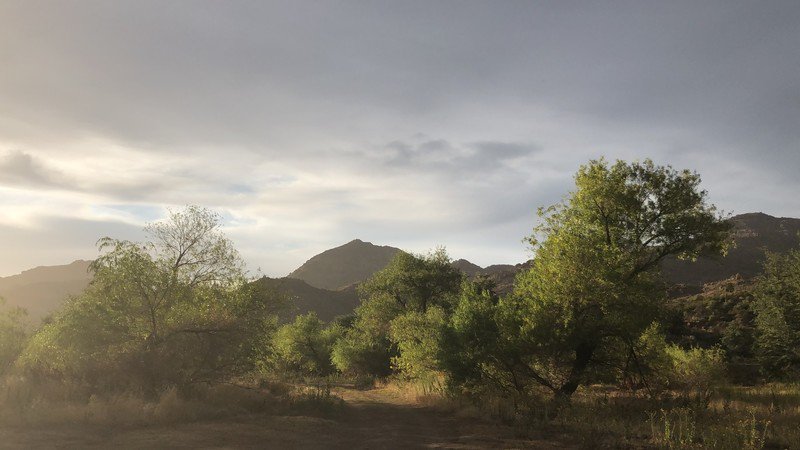For Immediate Release, July 8, 2021
|
Contact: |
Randi Spivak, (310) 779-4894, rspivak@biologicaldiversity.org |
Congress Must Pass Save Oak Flat Act to Protect Sacred Land in Arizona From Massive Copper Mine
WASHINGTON— More than 100 conservation, Indigenous and religious groups urged Congress today to pass the Save Oak Flat Act to protect the sacred site in central Arizona from being destroyed by a massive copper mine.
The House bill, introduced by Rep. Raul Grijalva (D-Ariz.), would overturn approval of a land exchange to trade away Oak Flat, known to the Apache as Chi'Chil'Ba'Goteel, to a mining company. For centuries this Apache sacred site, on the Tonto National Forest east of Phoenix, has played a role in Apache culture as a place to harvest medicinal plants and acorns and to hold coming-of-age ceremonies.
“A sacred area such as Oak Flat should never be traded away to an international mining company for profit,” the letter says. “It was an egregious error for Congress to authorize this land exchange in the first place.”
The land exchange failed five times as a stand-alone bill in Congress. In 2014 the trade was authorized by a last-minute amendment on an unrelated, must-pass defense spending bill. The rider required the land exchange to be completed no more than 60 days after publication of a final environmental analysis, no matter what its conclusions or how much damage the project would do.
“This bill will correct a reckless, callous mistake and ensure Oak Flat is safeguarded for future generations,” said Randi Spivak, public lands program director at the Center for Biological Diversity. “We can’t allow the mining industry to continue destroying sacred sites, plundering irreplaceable natural and cultural resources, and sucking up precious water supplies. Congress needs to pass this bill and protect Oak Flat.”
The Save Oak Flat Act would overturn the 2014 legislation, repealing authorization for the land swap to multinational mining giant Rio Tinto for the massive Resolution Copper mine. The bill has passed the House Natural Resources Committee and awaits a full House vote.
In the final days of the Trump administration, the U.S. Forest Service issued a rushed, flawed environmental analysis, setting the 60-day clock ticking to complete the land exchange. In March the Biden administration withdrew the environmental analysis to take a closer look at the devastating damage the proposed copper mine would do to Oak Flat.
“It’s a fundamental abdication of the U.S. government’s trust responsibility to Native American tribes to trade away this sacred land, and it’s illegal to do so without proper review and consideration of the vast devastation that would result,” Spivak said. “Passing the Save Oak Flat Act and repealing this backroom deal is how to right this wrong.”
Oak Flat was protected from mining by President Eisenhower in 1955 because of its outstanding cultural and ecological values, a mining ban that Rio Tinto seeks to evade by obtaining private ownership of the land. The site holds the best set of Apache cultural resources in existence and has for centuries provided Native people with food, medicine, habitation and a sacred place for religious ceremonies that are still conducted there today. It’s a stunningly beautiful area of dramatic rock formations, high-desert biodiversity and popular recreational opportunities, including world-class rock climbing.
Oak Flat is listed on the National Register of Historic Places in recognition of its irreplaceable cultural, historic and religious importance for the Western Apache and other tribes. It is part of the ancestral homelands of the Apache, Yavapai, Hopi, Zuni and other tribes in the Southwest.
Rio Tinto’s Resolution Copper mine would create a crater more than a mile wide and 1,000 feet deep. The 1.4 billion tons of toxic waste the mine would produce would be dumped on thousands of acres of nearby wildlands, turning a vibrant landscape into an industrial wasteland and threatening to contaminate groundwater and surface water in the area. The mine would use a vast amount of groundwater annually, equal to the amount used by the entire city of Tempe.
More than 70 Native American tribes and tribal associations support protecting Oak Flat, including the National Congress of American Indians, representing nearly all federally recognized tribes in the United States, and the Inter Tribal Association of Arizona.

The Center for Biological Diversity is a national, nonprofit conservation organization with more than 1.7 million members and online activists dedicated to the protection of endangered species and wild places.

